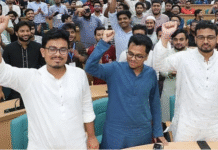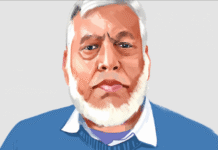Sadeq Khan
After a year of violent political unrest and socio-economic disorder, the nation-state has stepped into the new year of the Gregorian calendar in a state of stupor after the unilateral polls for transition of power held by the ruling alliance on January 5. No one disputes it was a voter-less election, a successful boycott of which by the 18-party opposition alliance and other opposition parties and alliances of right, left and centre resulting in no contest in 153 constituencies and mostly idle polling centres in the remaining 147 constituencies as visible to all observers.
Only in a few constituencies, members of the ruling alliance and some rebel members of the same camp had lively competition not so much in gathering voters but in stamping ballot papers at will wherever any of the rivals had the polling centre under the control of his or her following.
Everyone thereafter was surprised indeed by the hurry with which the authorities gazetted and sworn in the new parliament members, without waiting merely fifteen days for the 9thparliament to naturally expire or validating the oath taking of new parliament members by dissolving the old parliament. Further violation of the amended constitution, which is of Awami League’s own making, was made by the appointment of Sheikh Hasina as the succeeding Prime Minister of the 10thparliament by the President before the expiry of the ninth parliament. Some keen Bangladesh watchers have observed that Sheikh Hasina is in a state of nerves, afraid that she may have won the battle of parliamentary transition, but she may yet lose the war to defend her crown.
The fear psychosis
That fear is not so much from the disapproval of western powers and UN political counsel, who urged postponement of the polls and negotiated set-up of an election-time government for free, fair and participatory general election acceptable to the people. Only the regional hegemon India endorsed the Jan 5 election as an internal and constitutional “compulsion” of Bangladesh. As such, the international community as a whole (excepting India), including the Commonwealth, China and Russia, in their official comments on January 5 general election, noted that it had brought no resolution of the political crisis in Bangladesh. However, the defacto government of the 10th parliament has been offered continuing cooperation by the major powers, the western powers overtly and China covertly urging for urgent negotiations between the newly installed “all-party” (meaning ruling alliance partners under the command of Sheikh Hasina occupying both the benches of the House) government and the parties who have boycotted the polls, for an agreed formula for fresh elections.
The position of the international community is candidly reflected in the US State Department’s media briefing: “We have already made clear our disappointment with the elections (Jan 5 polls), which in our view did not credibly reflect the will of the Bangladeshi people since almost all of the seats of the new parliament weren’t contested or had only token opposition. (But) we obviously work with governments who are elected. The US will keep working with the Hasina government even as it continues to raise the concerns over the polls.” The massage of the Premier of China, on the other hand, emphasised on continuity of “all-area” bilateral cooperation, and said: “I would like to join hands with you, to advance continuously China-Bangladesh comprehensive and cooperative partnership to a new stage.”
Indian media noted that Delhi stood by its “ally” Hasina despite “sham” polls, and that “for Hasina, India swims against tide.” But for how long? Indian strategic analysts did not fail to note: “Awami League wins, democracy loses.” A weighty editorial opinion in a leading Indian daily dubbed the January 5 polls in Bangladesh as leaving “no real winners”, and advised Sheikh Hasina: “It is time the Awami League realised that while its fight against Islamism is a good fight, it simply cannot be won by polarising the nation politically.”
Political dynamics
Yet it is not “international pressure”, nor the denial of “democracy” that is worrying Sheikh Hasina or her backers in Delhi. Their real worry comes from a sea-change that has occurred in the internal dynamics Bangladesh polity through the turmoil of the last one year as a result of political miscalculations and power-drunk misadventures more than greedy misfeasance of Hasina government and its Delhi-based patrons. That internal dynamics of Bangladesh polity has not only left the Awami League isolated and in many places hated by the common folk, but also induced wide-spread anti-India sentiments, with increasing public appreciation of US goodwill.
It is thus no wonder that Begum Khaleda Zia, the main contender of power now leading even a broader informal alliance of political opinion in the country than her formal 18-party alliance, was triumphant in her press conference on January 15. She claimed that Sheikh Hasina was now leading an illegitimate government, and as such an irresponsible government: “It is very dangerous to allow such a government to prolong its existence. There is no alternative to an election with the participation of all under a non-party government that will reflect the will of people. Otherwise, it will not possible to restore peace and stability in the country.” She had ended her resistance programme of “continuous siege” of highways, railways and waterways after January 12, to offer relief to common people engaged in micro-economic activity in particular, and in her press conference on January 15, announced a series of “peaceful” programmes, including countrywide rallies on January 20 to thank people for their “rejection” of the January polls and black flag demonstration on January 29 to protest the “snatching” of people’s voting rights and “killing of democracy” by the ruling clique. She said, “fresh movement is afoot for restoration of democracy, fundamental rights and voting rights. It is not for power. Victory is inevitable. It is only a matter of time.”
Some listeners wondered how long that time might take and what surgical measures or magic wand would bring her that victory, if not power, given the softly softly plan of action she had announced. Some observers are more inclined to bet on an analysis put forward by democracy-watcher Grahame Lucas of Deutsche Welle, who commenting on the “deeply worrying” January 5 elections in Bangladesh inferred:
“Both Hasina and Zia head family dynasties with subservient political parties. These two parties do not serve to shape and formulate public opinion in a democratic fashion, but as instruments of the ruling cliques and their economic interests. Corruption in the highest places remains rampant, as Transparency International testifies. This has been the case for decades.
Deepening crisis
The latest crisis has three underlying causes: Firstly, the refusal of the Awami League to resign ahead of the poll and make way for a caretaker government to oversee the elections. The Awami League can argue quite legitimately that such an arrangement is not common practice in a functioning democracy where the government in power ensures the fairness of an election. But Bangladesh, as we have seen in the past few months, is not a functioning democracy because the parties do not trust each other to conduct a free and fair election. A caretaker arrangement would have averted most of the protests.
Secondly, the so-called International Crimes Tribunal set up ostensibly to lay to rest the terrible opening chapter of the history of Bangladesh: the war of independence against Pakistan, which saw millions killed and some 300,000 women raped. The government could have followed the Truth Commission model used by Nobel Prize winner Nelson Mandela in South Africa to heal the wounds of apartheid. But it did not. Instead it chose to seek punishment for the accused, including the death penalty. To achieve this goal it amended legal procedures retroactively, steps condemned by western human rights organizations and the UN. The fact that the accused were all senior members of Jamaat-e-Islami, the junior partners in government of the BNP on several occasions, and top BNP officials, meant that there could only be one outcome: Massive street protests and violence by their supporters, who saw evidence in the trial for the partisan stance of the government.
Thirdly, the decision by the High Court to bar Jamaat-e-Islami, a radical Islamist party, from the poll was a serious mistake. Since the government was seen to be behind the decision to bar Jamaat from the poll and behind the trial of its leadership at the war crimes tribunal, the party, which has never scored more than 10 percent in national elections, has mutated into a movement of self-styled martyrs, who no longer need to win the political argument. This ignores the fact that although 90 percent of Bangladeshis are Muslim, radical Islamism has never taken hold. The state is secular, something guaranteed in the constitution, not an Islamic Republic like Pakistan. For its part, the Awami League argues that Jamaat plans a theocracy based on sharia law.
“In reality, it appears that the Awami League was more interested in depriving the BNP of a potential coalition partner.
“Sheikh Hasina and the Awami League may have won, but it is a pyrrhic victory secured at the expense of the country’s democratic stability. And the army, which has already seized power on several occasions in the past, is waiting in the wings.”
Source: Weekly Holiday









